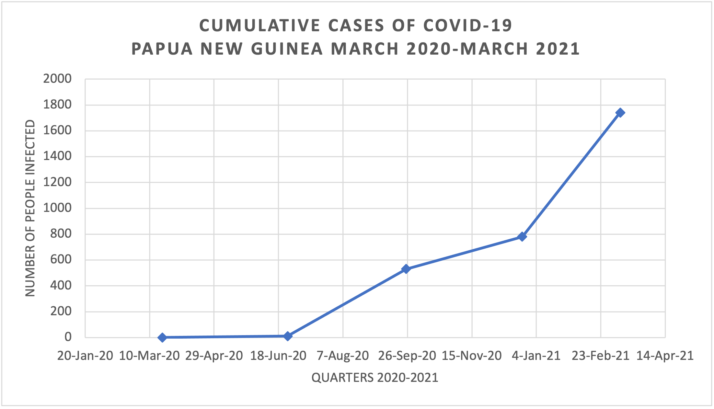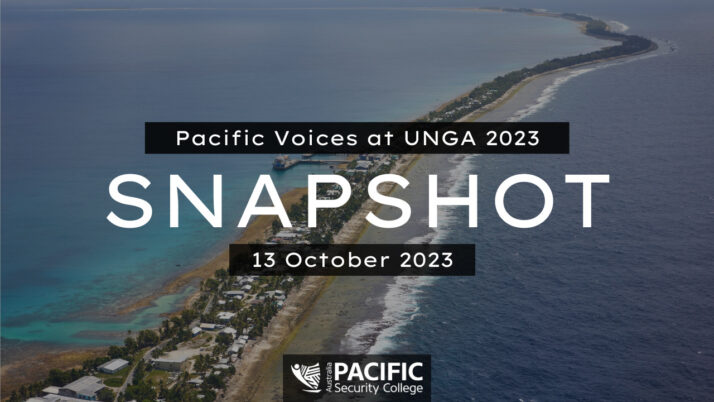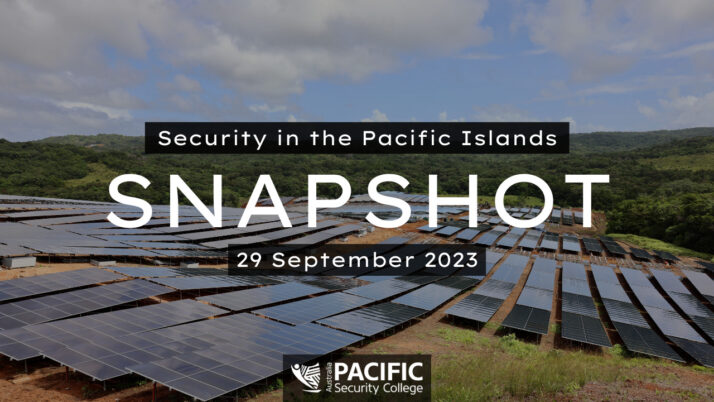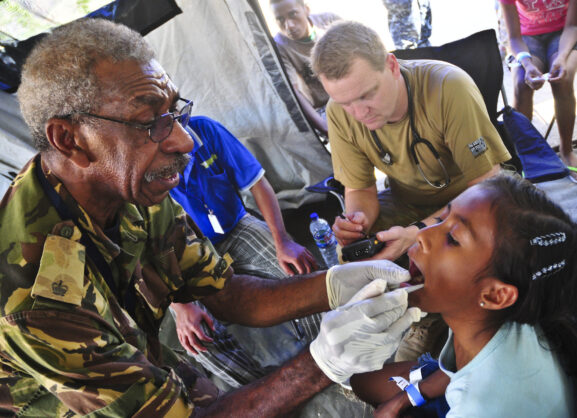PNG COVID19 Surge – The Numbers Don’t Tell the Full Story
Photo: Pacific Partnership
Henry Ivarature
“We’re going to see more deaths in the very near future. We should all do our very best to slow it [transmission] as much as possible, because if the number of new infections is such that there are too many sick people for our health system to cope with, the health system will collapse. It will literally collapse.”
That’s the dire assessment from Professor Glen Mola, of the University of Papua New Guinea. It’s a grim warning as Papua New Guinea (PNG), the Pacific Island region’s most populous nation, experiences a surge of COVID-19 cases, and a compounding death toll.
COVID-19 cases have doubled every week for the past month. But the numbers could be deceptive, if not analysed. On 10 March 2021, the cumulative total of COVID-19 cases detected since March 2020 was 1,741. Cases are disaggregated into ‘active’ cases and cases where people infected with the virus ‘recovered’. Of the 1,661 cases confirmed by 7 March 20201, the total number of ‘active’ cases was 200. The total number of ‘recovered’ cases was 846. If figures for ‘active’ cases, ‘recovered’ cases and the 16 deaths are subtracted from 1,661 cases, it would arrive at a total number of 599 unknown cases: reporting is not accurate.
Professor Mola’s warning alludes to the great public health emergency which PNG faces. Overrun with cases, wards in the country’s hospitals are now no-longer able to isolate COVID-19 patients, turning major hospitals into breeding grounds for the virus, with the most vulnerable directly impacted. With COVID-19 arriving at hospital doorsteps and the country now facing a critical shortage of PPE and other medical supplies, the country’s health workers are testing positive to the virus in increasing numbers. Many health workers are off sick with the virus, with those still working facing chronic fatigue and low morale. Some hospitals are turning away patients, with no choice but to scale-down services.
The number of known cases likely just scratches the surface of the true rate of COVID-19 in PNG due to low testing rates. By 7 March 2021, twelve months into the pandemic, the total number of people tested was just 47,490. In a population of eight million, this is negligible and fails to inform the public health responses, prevention measures and vaccination. If you do not know where the virus is, or who has it, it is impossible to isolate, track and trace the virus – stymying any hope for success at pandemic management.
The problem is particularly acute in rural parts of the country. In the Autonomous Region of Bougainville, the government has warned that it now has a critically low number of test kits: any figures that emerge from Bougainville must be taken with a grain of salt. The Solomon Islands Prime Minister has urged his citizens to avoid contact with Bougainvilleans at risk of transmitting the virus.
PNG is a vast nation, from the rugged mountains to the islands. The fact that seventeen of 22 provinces have now recorded at least one case of COVID-19 highlights that the insidious virus has spread far-and-wide. Given how easily the virus is transmitted, it is certain that for provinces where just a handful of cases have been confirmed, the true incidence of the virus is far greater, however low testing results keep official figures down. Of particular concern, the fastest growth in cases has been in West Sepik and West New Britain provinces, the former province shares a land and sea border with Indonesian-controlled West Papua. Australia is already taking preventative measures, including vaccination in the Torres Strait bordering PNG’s Western Province which aside from COVID-19 has drug-resistant tuberculosis.
COVID 19 Cases by Province as at March 2020 – March 2021
| Province | Cumulative Cases |
| National Capital District | 761 |
| Western Province | 324 |
| West New Britain | 197 |
| West Sepik | 159 |
| Morobe | 53 |
| Madang | 43 |
| Bougainville | 39 |
| East New Britain | 38 |
| Western Highlands | 27 |
| Eastern Highlands | 24 |
| New Ireland | 23 |
| Central | 20 |
| East Sepik | 15 |
| Jiwaka | 8 |
| Enga | 4 |
| Southern Highlands | 3 |
| Milne Bay | 2 |
| Hela | 1 |
| Total | 1,741 |
Professor Mola believes a State of Emergency, inclusive of a heavy handed approach to enforce compliance might help address spiralling infection rates. In February, I wrote for the Australian National University’s Development Bulletin that the pandemic reconfigured relations between state and society, with citizens asked to momentarily forgo liberties and freedoms in the interests of national security. I contended that PNG society is considered strong in the sense that most citizens do not comply with measures and regulations issued by the state, exposing weaknesses in the capability of state agencies to enforce COVID-19 regulations.
While businesses resist lockdowns for economic reasons, it seems to be the most effective measure in containing the spread. The graph below charts a strong correlation between lockdown and curbing the spread of COVID-19 from March to June 2020. However, as soon as the lockdown was lifted and travel between provinces recommenced in June, a surge in COVD-19 cases was detected as the virus spread across the country. This spread coincided with the Niupela Pasin policy, championed by Prime Minister Marape who urged citizens to ‘learn to live with COVIVD-19’. Cases continued to increase steadily and also spread across the country.
Now, lockdown has been reintroduced in Lae, while in the National Capital District (NCD), where COVID-19 cases have increased through community transmission, the Governor’s suggestion to consider introducing a lockdown when case numbers reach 1,000 is a policy decision ripe for a public health disaster. NCD’s known cases are currently 761 – but rising quickly and spreading rapidly. The true number is likely far greater.
To arrest the spread of the virus, lockdowns should be complemented by a vaccination program targeting frontline workers, particularly health workers who are suffering. With the first vaccine doses not due to arrive until April, there is no time to waste.

Source: Compiled from COVID-19 cases released by Royal Papua New Guinea Constabulary
More Stories

Security Snapshot - 13 Oct 2023
Pacific Security Snapshot: Pacific voices at the United Nations
In this special edition of the Pacific Security Snapshot, we look at the key issues raised by Pacific leaders at the recent United Nations General Assembly, including climate change, reform to multilateral institutions and ocean health. “These challenges might be inconvenient for large economies – but I can assure the climate impacts already at our…

Security Snapshot - 29 Sep 2023
Pacific Security Snapshot | 29 September 2023
The security stories shaping the region ➣ 2nd United States-Pacific Islands Forum Summit ➣ Niue and Cook Islands forge diplomatic ties with United States ➣ Chinese navy vessel arrives in Papua New Guinea ➣ Pacific climate change advocacy at the United Nations ➣ El Niño is officially declared ➣ Fifteenth Pacific Health Ministers Meeting in…







